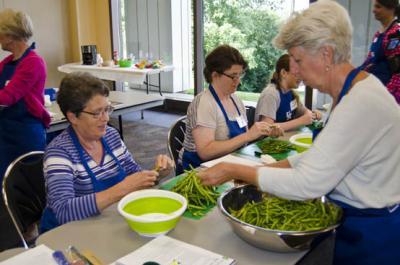
Cheryl Case, right, helps a food preservation workshop particpant break beans
Preserving food at the height of summer to consume in the pit of winter—at one time, was a skill that nearly every woman learned from her mother and passed on to her daughters. With the advent of grocery stores and a food distribution system that defies the seasons, food preservation skills have declined over the past three or four decades.
Recently, folks with the Kentucky Nutrition Education Program have seen a renewed interest in food preservation and responded by creating a three-day “boot camp” style workshop in methods that include canning, freezing and drying. Retired family and consumer sciences extension agents are teaching the workshops around the state for the second summer.
“We’re trying to reach families with information that will help them make good financial and healthy choices in terms of selecting and preserving their food,” said Renee Fox, nutrition and marketing specialist with the Nutrition Education Program. “Many of them don’t know these techniques. Sometimes it’s been lost over the generations, but even if they do have the skills, some of the products and regulations have changed as we’ve learned more about food preservation, so we want to make sure they’re using the safest methods and doing things the right way.”
On the first day of a recent workshop in Scott County, retired agents Grace Angotti and Cheryl Case taught the 15 participants about different canning methods, the proper equipment and safety considerations. In the more than 20 years each woman worked as an extension agent, they’ve seen interest in home food preservation ebb and flow.
“I think it’s part of the Farm to Table movement, where we’re interested in knowing where our food originates. We want to know that food is healthy and safe. We want to know what’s in our food, and we want it to be as natural as possible,” Case said.
Angotti remembered, in particular, the reaction of an enthusiastic participant at a 2015 workshop.
“As soon as we learned to can green beans, she went home and did a mess of green beans and some corn,” Angotti said. “And then she brought us pictures of them.”
The workshops are under the umbrella of The Kentucky Nutrition Education Program, which includes two U.S. Department of Agriculture programs for limited-resource families and individuals: The Expanded Food and Nutrition Education Program, EFNEP, and the Supplemental Nutrition Assistance Program Education, known as SNAP-Ed. The goal of both programs is to educate program participants on how to plan nutritious meals on a restricted budget, acquire safe food handling practices, improve food preparation skills and develop behaviors that will result in a healthy lifestyle.
“Obesity (in the state) is high; blood pressure is a big concern. Eating healthy can go a long way in lowering your health risks. It’s really vital,” Fox said. “SNAP-Ed and food preservation workshops are making a difference in people’s lives.”
